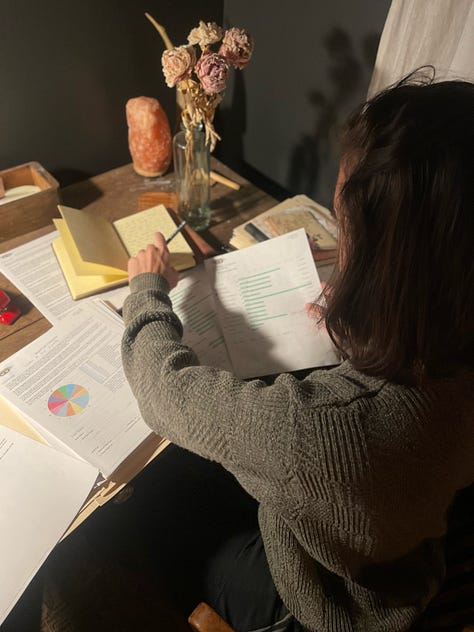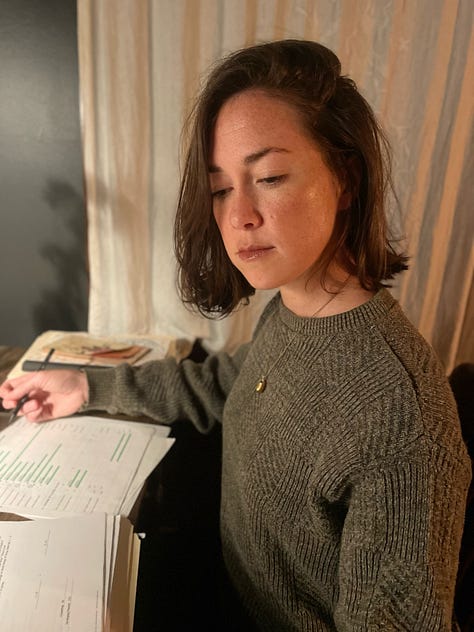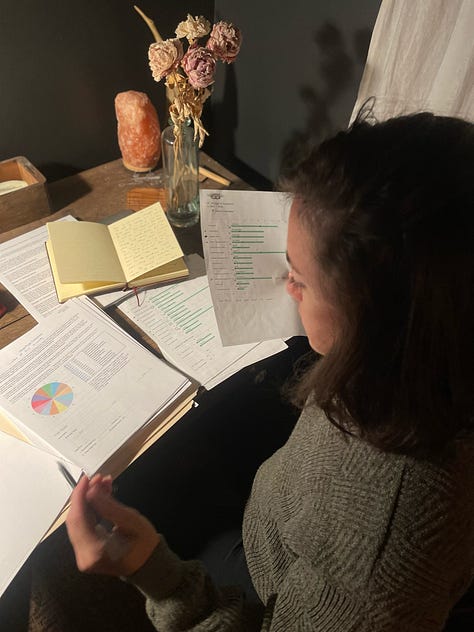My Introduction to the Hartman Value Profile
The first time I took the profile, and my first simple action step



I was introduced to the Hartman Value Profile a few years ago when I took it as a precursor to a writing project. As a “gotta experience it myself” kinda person, I often went through the processes or services that the client offered before I wrote about it.
It’s a good thing I experienced it firsthand. Otherwise, I’d never have given it another thought. The description of the profile sounded complicated and didn’t make a lot of sense. I wasn’t sure about how measuring “goodness” and “value” and “judgment” had anything to do with the current state of my life, marriage, and never-ending workload, which was all held together by coffee, therapists, and urgent deadlines.
The process was simple and straightforward. I took the profile. The facilitator sent my report over and asked to schedule a call to go over it. I printed all 22 pages of the document and dramatically tossed the stack of papers across the dining room table while telling my husband, through tears, that it somehow measured everything wrong with me.
I was incorrect. None of it indicated “everything wrong with me.” But before understanding the report, I was convinced that all 22 pages detailed every single problem about who I was.
A few days later in my actual session, we went line-by-line through all 38 indicators. I was surprised to hear how clearly the descriptions of my scores reflected the ways I was trying to juggle my life. I was more surprised to hear that I had “really strong judgment scores” and that it looked like I was the one regularly disregarding my own perspectives.
There were scores that reflected the way I alternately tip-toed around and stormed through conflict, and the differences between how I valued other people and how I valued myself.
The facilitator suggested I practice simply sharing my own perspective each time I was tempted to bite my tongue and say nothing. The hardest work would be learning to trust the things I was good at, and then, ya know, use those strengths.
I was used to thinking about what other people would think about me. Her suggestion was a small step that I could practice daily, each time I found myself biting my tongue or deciding it “wasn’t worth the fight.” This pressured me, in the most elegant way possible, to think about what I thought about myself.
As I continued this simple practice over the next half a year, it was like metaphorically stirring the rocks in the bottom of a fish tank. The water looks clean enough until it’s disrupted, and then there’s fish shit swirling everywhere.
Each time I practiced making these little decisions about what I needed to share in order to have a little self-respect, it seemingly made things more messy. I often thought about leaving that stuff buried in the rocks at the bottom of the tank.
At the same time, I was starting to learn about this idea called differentiation. In a nutshell, I understood differentiation as being capable of staying connected with other people while still being myself.
So far, I usually felt most like I could be myself when I wasn’t too close with other people. When I was connected with anyone who I cared about, I felt like I was being jerked around by their actions or choices. I wanted to be myself and belong with others.
Becoming capable of both caring about people I loved and also being someone I respected at the same time seemed like the most terrifying and exciting possibility.
It seemed I was going to have to rethink some key ideas I had about relationships if I was going to become “more differentiated.”
I’d have to become better at not reacting, even when other people were reacting. That was challenging. I was always uncomfortable with other people reacting. So, I had to start learning to calm myself down rather than spouting off louder than the person across from me.
I had to become more clear about who I was, so I could decide if I liked myself, without looking for someone else to tell me if I was okay.
The more I started controlling myself, the less I tried to control the people around me. I still tried to control others, to manage my own feelings. But sometimes I’d remember in the middle of it, pause, and start thinking about where I could practice self-control. Self-respect felt good and I started developing a taste for it.
After about nine months of this, I started to forget what it had been like to bite my tongue all the time.
I was invited to do another writing project, and I took the HVP again to see the updates that had been made since I first took it. I took the profile for work, similar to the first round, and the results of my report surprised me. Again.
The score that had previously reflected my tendency to bite my tongue and keep quiet had become so strong that she suggested I could relax a little.
Other scores shifted a little, too. Especially one that measured my ability to be clear about what is important to me, and another one that reflected my ability to experience my own worth.
While I was practicing that one little step and stirring up all the dirty fish tank water in my life, change had been happening. I just hadn’t been able to see it.
It wasn’t all better. There’s a section called the “Balance Scores.” And for a hot second, the areas that indicated I was out of balance became even more unbalanced.
One called “Balance of Self-Esteem,” I was sliding off the negative side of this scale, even further than the first time I took it. As I stopped blaming other people as much and started looking at myself, I just redirected my load of contempt and anger toward that face in the mirror and slid even further down the negative side of this indicator.
I was building self-respect and was terribly disappointed in myself, at the same time.
I started to see that the report was a sort of map and pointed out potential pitfalls as much as strengths and gifts. The report was like a mirror, reflecting who I was, how I was making decisions, and where I was going, in real time.
I was getting a feel for my own internal equilibrium, and it was even better than I imagined. The water in my metaphorical fish tank was still murky, but even through the mess, I could start to see that I had a lot of choices around the direction I was heading. I liked that.
So, after I took the report a second time, I started paying attention to this Hartman Value Profile thing.


This made a lot of sense! Thanks for your perspective!!
Really great self reflections. I can relate to this so much. I like how you balance your self esteem and humility in your writing! I’m really going through some similar growth and it feels good.